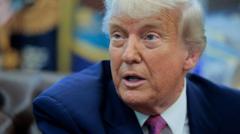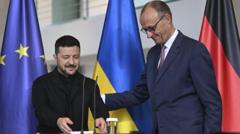With U.S. tariffs climbing, businesses face increased pressure to find ways to circumvent these costs. As companies report rising instances of trade fraud, experts warn that government efforts to manage such issues are falling short, leading to an environment fraught with unethical practices.
Mounting Trade Fraud: The Dark Side of Rising U.S. Tariffs

Mounting Trade Fraud: The Dark Side of Rising U.S. Tariffs
As U.S. tariffs escalate, companies report a surge in fraudulent practices aimed at evading these taxes, raising concerns about the government's ability to tackle this growing issue.
---
As President Trump's tariffs have significantly escalated in recent months, a corresponding rise in trade fraud among U.S. firms has emerged as a pressing concern. Many businesses, particularly importers, report receiving unsolicited offers from shipping entities promising methods to circumvent the increased tariff rates. One executive from Charlotte Pipe and Foundry in North Carolina characterized the U.S. government's attempts to combat fraudulent practices as akin to "playing Whac-a-Mole," indicating the ongoing challenge they face.
According to these firms, a flurry of communications is being sent from companies in China advertising strategies to mitigate or completely erase the tariffs on various imported goods such as apparel, auto parts, and jewelry. Some of these messages explicitly claim, “Beat U.S. Tariffs,” or “Great News! The tariffs have been dropped finally!”
While the services offered may be marketed as legitimate solutions, they involve circumventing tariff assessments either by misreporting the information about the goods or via transshipment—shipping goods through a third country with lower tariffs before they reach the U.S. market. Such practices are recognized as customs fraud by experts in trade compliance.
This rising frequency of trade fraud highlights the struggle that U.S. companies encounter as they attempt to adapt to the shifting landscape of international trade and tariffs, laying bare the urgent need for improved customs enforcement and regulatory oversight. Executives stress that while they want to comply with legal trade practices, the pressures of inflated tariffs incentivize unethical behavior.
As President Trump's tariffs have significantly escalated in recent months, a corresponding rise in trade fraud among U.S. firms has emerged as a pressing concern. Many businesses, particularly importers, report receiving unsolicited offers from shipping entities promising methods to circumvent the increased tariff rates. One executive from Charlotte Pipe and Foundry in North Carolina characterized the U.S. government's attempts to combat fraudulent practices as akin to "playing Whac-a-Mole," indicating the ongoing challenge they face.
According to these firms, a flurry of communications is being sent from companies in China advertising strategies to mitigate or completely erase the tariffs on various imported goods such as apparel, auto parts, and jewelry. Some of these messages explicitly claim, “Beat U.S. Tariffs,” or “Great News! The tariffs have been dropped finally!”
While the services offered may be marketed as legitimate solutions, they involve circumventing tariff assessments either by misreporting the information about the goods or via transshipment—shipping goods through a third country with lower tariffs before they reach the U.S. market. Such practices are recognized as customs fraud by experts in trade compliance.
This rising frequency of trade fraud highlights the struggle that U.S. companies encounter as they attempt to adapt to the shifting landscape of international trade and tariffs, laying bare the urgent need for improved customs enforcement and regulatory oversight. Executives stress that while they want to comply with legal trade practices, the pressures of inflated tariffs incentivize unethical behavior.





















